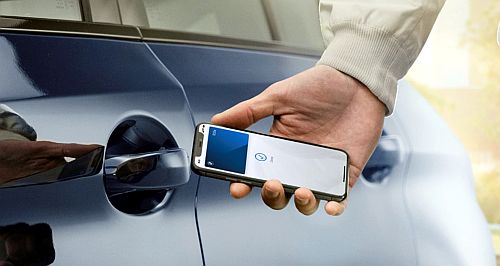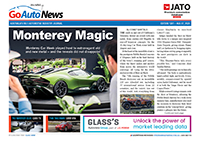Make / Model Search
News - VolkswagenBMW and VW to expand digital key functionalityGerman car-makers focus on democratising digital key tech with more functions22 Aug 2025 DIGITAL key evolution continues apace as car-makers including BMW and Volkswagen Group work to capitalise on rapidly expanding functionality and an expected quadrupling of cars fitted with the technology to 59 million units globally by 2031.
They, and many other brands, are collaborating with technology giants Apple and Google, and organisations such as the Car Connectivity Consortium to expedite digital key development to offer many more functions than currently available.
Digital keys rely on technologies like near field communication (NFC) and ultrawideband to wirelessly exchange data, with keys securely stored in a smartphone’s digital wallet or a dedicated manufacturer's app.
The tech means manufacturers can cut costs because they will not have to produce a physical key (although the vehicle owner is less likely to lose their key and have to pay a potentially high price to replace it).
A digital key app is also a means for car-makers to constantly stay front-of-mind with their customers, potentially bolstering brand loyalty and retention.
In their current form, digital keys use a smartphone or smartwatch to perform the functions of a traditional car key, such as locking, unlocking, and starting the vehicle among others.
Digital keys are predicted to soon go beyond the convenience of automatically unlocking a vehicle as features already in-market or under development include the ability to share a digital key, connectivity with a 'smarthome' system, facial recognition and time-specific use.
Tesla pioneered the digital key, while BMW entered the field a year later in 2018 with the launch of a smartphone-based digital key using NFC technology enabling drivers to unlock and start their cars without a physical fob.
Automotive News reports that BMW has expanded its digital key system to a wider range of models, beginning in March with the all-electric iX SUV.
BMW collaborated with Apple and the Car Connectivity Consortium to establish the Digital Key specification 3.0 for ultrawideband technology.
“The update, which simplifies the smartphone-based key setup, will extend to several models this year,” according to BMW.
“The revised system introduces a setup card, which allows users to initiate digital key pairing by scanning a QR code or tapping the card to a supported smartphone.
Once activated, the BMW digital key can be shared with up to 18 devices. Owners can assign different levels of access and permissions to each user, including restrictions on acceleration and top speed, aimed at use cases such as novice drivers.
‘Digital Key Plus’ will be standard on all vehicles using BMW’s incoming Neue Klasse architecture.
Automotive News says BMW’s Digital Key Plus is designed to be highly secure, using ultrawideband technology and precise localisation eliminate relay attacks (where a key’s radio signal is jammed or intercepted).
Volkswagen Group’s digital key program is developed by its software arm, Cariad, which combines ultrawideband technology and Bluetooth low energy technology to enable interaction between the vehicle and a smart device with software based on the Car Connectivity Consortium standard, according to Automotive News.
The second-generation digital key is already in use across several Audi models, including the Q6 E-Tron, A6 E-Tron, and latest A5 and Q5.
“Digital key technology has been primarily adopted in the luxury car segment to date and is still in its infancy and will continue to evolve,” said Niklas Floren, the CEO of VW-owned technology specialist WirelessCar.
“Many new cars don’t yet have digital keys and it is still a differentiating feature for a premium vehicle to offer.
“The idea is to make all of this as seamless as possible and work exactly how you expect it to, which are the main concerns when developing a technology like this.
“The Amazon delivery guy can leave the package in the trunk of the car instead of in front of your door by getting access to the trunk at the right time, making deliveries a bit more secure,” he explained.
Mr Floren said he imagines a future where digital keys are democratised and standard across all vehicles, making the process of renting a car more streamlined.
The clincher for the technology appears to be the adoption of ultrawideband technology that has taken digital access further by enabling precise location tracking and passive entry.
It is more sensitive than NFC, enabling the car to detect a user’s phone from a distance of up to 10 meters, automatically unlocking the doors without physical interaction and offers “stronger resistance to relay attacks because of its real-time location verification, making it a preferred option for next-generation keyless systems”.
The digital key is a development of “Smart Key” technology pioneered in the 1990s by German company Siemens and used in Mercedes-Benz cars to unlock, start and control certain vehicle functions.  |
Click to shareVolkswagen articlesResearch Volkswagen Motor industry news |









Facebook Twitter Instagram